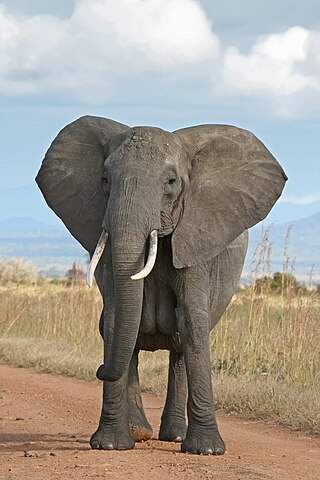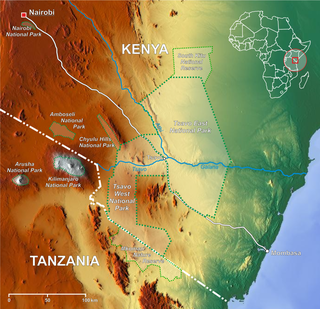Related Research Articles

Elephants are the largest living land animals. Three living species are currently recognised: the African bush elephant, the African forest elephant, and the Asian elephant. They are the only surviving members of the family Elephantidae and the order Proboscidea; extinct relatives include mammoths and mastodons. Distinctive features of elephants include a long proboscis called a trunk, tusks, large ear flaps, pillar-like legs, and tough but sensitive grey skin. The trunk is prehensile, bringing food and water to the mouth and grasping objects. Tusks, which are derived from the incisor teeth, serve both as weapons and as tools for moving objects and digging. The large ear flaps assist in maintaining a constant body temperature as well as in communication. African elephants have larger ears and concave backs, whereas Asian elephants have smaller ears and convex or level backs.
Tsavo East National Park is a national park in Kenya with an area of 13,747 km2 (5,308 sq mi). It was established in April 1948 and covers a semi-arid area previously known as the Taru Desert. Together with the Tsavo West National Park, it forms an area of about 22,000 square kilometers. The Tsavo River flows west to east through the national park, which is located in the Taita-Taveta County of the former Coast Province.
Amboseli National Park, formerly Maasai Amboseli Game Reserve, is a national park in Kajiado South Constituency in Kajiado County, Kenya. It is 39,206 ha (392.06 km2) in size at the core of an 8,000 km2 (3,100 sq mi) ecosystem that spreads across the Kenya-Tanzania border. The local people are mainly Maasai, but people from other parts of the country have settled there attracted by the successful tourist-driven economy and intensive agriculture along the system of swamps that makes this low-rainfall area, average 350 mm (14 in), one of the best wildlife-viewing experiences in the world with 400 species of birds including water birds like pelicans, kingfishers, crakes, hamerkop and 47 raptor species.

African elephants are members of the genus Loxodonta comprising two living elephant species, the African bush elephant and the smaller African forest elephant. Both are social herbivores with grey skin, but differ in the size and colour of their tusks and in the shape and size of their ears and skulls.
The Born Free Foundation is an international wildlife charity that campaigns to "Keep Wildlife in the Wild". It protects wild animals in their natural habitat, campaigns against the keeping of wild animals in captivity and rescues wild animals in need. It also promotes compassionate conservation, which takes into account the welfare of individual animals in conservation initiatives. Born Free also creates and provides educational materials and activities that reflect the charity’s values.

Katharine Boynton "Katy" Payne is an American zoologist and researcher in the Bioacoustics Research Program at the Laboratory of Ornithology at Cornell University. Payne studied music and biology in college and after a decade doing research in the savanna elephant country in Kenya, Zimbabwe, and Namibia, she founded Cornell's Elephant Listening Project in 1999.
Elephant cognition is animal cognition as present in elephants. Most contemporary ethologists view the elephant as one of the world's most intelligent animals. With a mass of just over 5 kg (11 lb), an elephant's brain has more mass than that of any other land animal, and although the largest whales have body masses twenty times those of a typical elephant, a whale's brain is barely twice the mass of an elephant's brain. In addition, elephants have around 257 billion neurons. Elephant brains are similar to humans and many other mammals in terms of general connectivity and functional areas, with several unique structural differences. Although initially estimated to have as many neurons as a human brain, the elephant's brain has about three times the amount of neurons as a human brain. However, the elephant's cerebral cortex has about one-third of the number of neurons as a human's cerebral cortex.
The Amboseli Baboon Project is a long-term, individual-based research project on yellow baboons in the Amboseli basin of southern Kenya. Founded in 1971, it is one of the longest-running studies of a wild primate in the world. Research at the Amboseli Baboon Project centers on processes at the individual, group, and population levels, and in recent years has also included other aspects of baboon biology, such as genetics, hormones, nutrition, hybridization, parasitology, and relations with other species. The project is affiliated with the Department of Ecology and Evolutionary Biology at Princeton University, the Department of Biology and the Evolutionary Anthropology Department at Duke University, and the Department of Biological Sciences at the University of Notre Dame.

The African bush elephant, also known as the African savanna elephant, is one of two extant African elephant species and one of three extant elephant species. It is the largest living terrestrial animal, with bulls reaching a shoulder height of up to 3.96 m and a body mass of up to 10.4 t.
Cynthia Jane Moss is an American ethologist and conservationist, wildlife researcher, and writer. Her studies have concentrated on the demography, behavior, social organization, and population dynamics of the African elephants of Amboseli. She is the director of the Amboseli Elephant Research Project, and is the program director and trustee for the Amboseli Trust for Elephants (ATE).
Produced by the Environmental Systems Research Institute, the Esri International User Conference is the world's largest event dedicated to geographic information system (GIS) technology. It is held annually in the United States, usually for one week in July at the San Diego Convention Center in San Diego, California. The Esri UC dates back to 1981. In 2008, conference attendance grew to more than 14,000 attendees.

The Sheldrick Wildlife Trust (SWT) operates an orphan elephant rescue and wildlife rehabilitation program in Kenya. It was founded in 1977 by Dame Daphne Sheldrick to honor her late husband, David Sheldrick. Since 2001, it has been run by their daughter, Angela Sheldrick.
Echo was an African bush elephant matriarch who was studied for over 30 years by ethologist Cynthia Moss, beginning in 1973, and was the subject of several books and films. She was the first subject of the Amboseli Elephant Research Project, the longest-running study of a land mammal. The study of Echo and her family contributed significantly to the understanding of elephants, including their life-cycles, methods of communication, emotional lives, and cooperative care of the young.
Jeanne Altmann, born March 18, 1940, in New York City, is a professor emerita and Eugene Higgins Professor of ecology and evolutionary biology currently at Princeton University. She is known for her research on the social behaviour of baboons and her contributions to contemporary primate behavioural ecology. She is a founder and co-director of the Amboseli Baboon Research Project. Her paper in 1974 on the observational study of behaviour is a cornerstone for ecologists and has been cited more than 10,000 times. She is a Fellow of the National Academy of Sciences, and a member of the American Philosophical Society (2020)

The Tsavo Trust is a non-profit wildlife conservation organisation, which covers Tsavo East National Park, Tsavo West National Park, and Chyulu Hills National Park in Kenya. The trust was founded by Nzioki Wa Makau and Richard Moller who is chief executive officer and an experienced bush pilot. The started aim of the trust is the protection of wildlife, especially African elephants, and the reduction of the ivory trade. In June 2014, the Tsavo Trust came into the international spotlight when it announced the death of Kenya's iconic and most well-known elephant, Satao, killed by an ivory poacher with a poisoned arrow.
Joyce Hatheway Poole is an elephant researcher based at the Gorongosa National Park in Mozambique. Her body of research has led to discoveries about their social and sexual lives and their communicative and cognitive abilities. Her work and research on elephant societies played a central role in the eventual international ban on the trade of ivory. She became the head of the Elephant Program for the Kenya Wildlife Service from 1990 to 1994.

The Elephant Queen is a 2018 documentary film directed by Victoria Stone and Mark Deeble, and narrated by Chiwetel Ejiofor. It tells the journey of a family of elephants in the African savannah when they are forced to leave their waterhole. The film was produced by Lucinda Englehart under the banner of Deeble & Stone.
Pierre Auger is a French bio-mathematician born on March 8, 1953, in Neuilly-sur-Seine. He is a member of the French Academy of sciences and Director of Exceptional Class Research at the Research Institute for Development. Pierre Auger's research field concerns the mathematical modelling of biological systems.

Elephants communicate with each other in various ways, including touching, visual displays, vocalisations, seismic vibrations, and semiochemicals.

Winnie Kiiru is a Kenyan biologist, elephant conservationist, and the chairperson of the Wildlife Research Institute in Naivasha. She is currently the chairperson of Friends of Karura Forest, a Community-Based Organization (CBO) that helps manage Karura forests.
References
- ↑ "Amboseli & Us: Project History". Amboseli Trust for Elephants. Archived from the original on February 3, 2014. Retrieved January 26, 2014.
- ↑ Jane E. Brody (December 20, 1994). "Border Path Is Deadly for 3 Elephants". The New York Times. Retrieved January 26, 2014.
- ↑ Karen McComb; Cynthia Moss; Sarah M. Durant; Lucy Baker; Soila Sayialel (April 20, 2001). "Matriarchs as Repositories of Social Knowledge in African Elephants" (PDF). Science. 292 (5516): 491–494. Bibcode:2001Sci...292..491M. doi:10.1126/science.1057895. PMID 11313492. S2CID 17594461.
- ↑ Mike Birkhead (2010). "Echo: An Elephant to Remember". PBS.
- ↑ Rupi Mangat (March 17, 2008). "Amboseli - Dim Future for the Elephants". The East African.